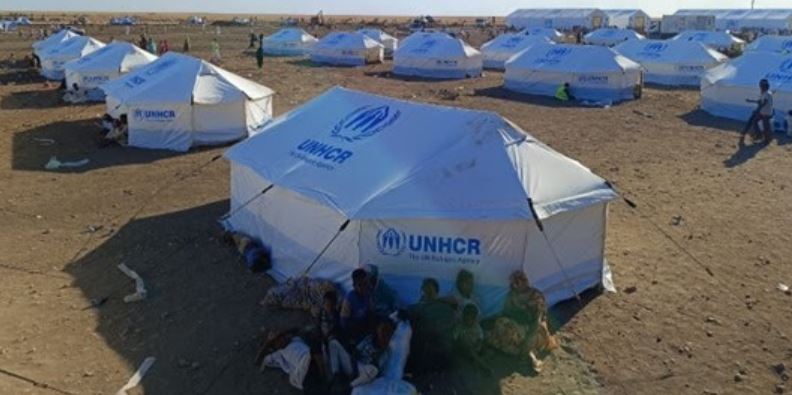The United Nations Office for the Coordination of Humanitarian Affairs (OCHA) in a statement on Tuesday said thousands of civilians continue to flee following a wave of armed violence and attacks on over 30 villages and towns in parts of Sudan’s Al Jazirah State since 20 October.
According to OCHA, the Sudan INGO Forum, a group of 70 international NGOs working in Sudan, said in a statement that the escalation of hostilities in eastern Al Jazirah State was marked by some of the most extreme violence in the past 18 months. The Forum urged the international community to act on the UN Secretary-General’s call for decisive action to protect civilians and ensure safe and unfettered aid delivery across Sudan.
“Almost two weeks after the attacks started, there are reports of displaced children arriving with multiple injuries due to gunshots, while reportedly arbitrary arrests and detention of children in parts of Aj Jazirah State continue,” the update said. “There are reports of missing and unaccompanied or separated children among the displaced people. In addition, alarming reports of sexual violence against young girls and adolescents continue to be reported, with some yet-to-be-verified cases of women and girls subjected to sexual assault and violence committing suicide. Food crops have been burned or destroyed and solar systems operating water supply systems have been vandalized, affecting the ability of families and communities to access water for domestic and farming purposes.”
“Insecurity and lack of sustained communication channels are impacting the ability of humanitarian organizations to collect information and data on the situation in parts of Al Jazirah that have been subjected to violence and attacks,” it added.
On 1 November, the International Organization for Migration (IOM) Displacement Tracking Matrix (DTM) reported in its Flash Alert on Aj Jazirah State that about an estimated 135,400 people (27,081 families) had been displaced from various locations in Al Jazirah State between 20 and 30 October 2024. The internally displaced persons (IDPs) are in 16 localities in Gedaref, Kassala, and River Nile states. About 76,900 people were displaced to Al Fao, Al Mafaza, Al Butanah, Ar Rahad, Galabat Ash-Shargiah, Madinat Al Gedaref, and Wasat Al Gedaref localities in Gedaref.
About 40,500 people were displaced to Halfa Aj Jadeedah, Rei Khashm Elgirba, and Rei Nahr Atbara localities in Kassala. Another 18,000 people were displaced to Abu Hamad, Atbara, Al Matama, Ad Damar, Barbar, and Shendi localities in River Nile State. IOM DTM field teams have also received reports that many people displaced transited through Halfa Aj Jadeedah locality in Kassala State and Al Butanah and Al Fao localities in Gedaref State. Many IDPs may transit through Gedaref to reach Kassala or River Nile, and even Khartoum, Northern, or Red Sea states, according to IOM DTM.
DTM field teams report that some affected people cannot relocate to safe areas due to movement restrictions. IDPs may continue to relocate depending on the capacity of shelter sites, the establishment of new gathering sites or reception centers, and the availability of humanitarian assistance. Many individuals were moving on foot, and the majority of the IDPs were reportedly women and children. In Gedaref, humanitarian partners report that more than 50 percent of the new arrivals are women and children.
Some areas are not accessible for humanitarians, making it challenging to deliver essential services and support to the displaced people.
According to OCHA, humanitarian partners in Kassala and Gedaref are scaling up response and mobilizing resources to meet the immediate needs of the newly arrived displaced people from Aj Jazirah. National NGOs are providing daily hot meals for 1,600 IDPs in Gedaref.
“Food security and livelihoods (FSL) cluster partners are finalizing preparations to distribute high-energy biscuits for 8,000 IDPs. In addition, once the total number of new IDPs from Aj Jazirah is verified, humanitarian partners will distribute food rations to all registered IDPs. Meanwhile, a FSL cluster partner has distributed food baskets for about 4,500 IDPs, and the procurement of an additional 2,700 food baskets is being finalized,” the OCHA update said. “In Kassala, the state government has allocated two plots of land in Nahar Atbata – one in Village 6 and the other in Domiyad, with a total size of 71 feddans, for the construction of camps to host IDPs. FSL partners have provided 14.38 metric tonnes of high-energy biscuits to about 16,000 IDPs in Halfa al Jadeeda and provided 3.8 metric tonnes of Plumpy Doz nutritional supplements to 2,800 women and children. Another 3,166 displaced people in Gedaref, including 1,400 children under five, received nutritional supplements.”
Emergency shelter and NFIs cluster partners have dispatched to New Halfa in Kassala four rub halls, 200 family tents, distributed 5,065 core relief items, and 10,530 pieces of soap. Some tents have already been installed in the reception center in Village 6. In Gedaref, about 1,000 Emergency Shelter Kits and 2,400 NFI kits will be distributed shortly once the IDP numbers in targeted areas are verified. Mobile clinics are providing health services.
Meanwhile, protection and psychosocial awareness-raising sessions reached 3,433 people, and a special desk on mental health and psychosocial counseling received 100 traumatized patients, mainly women and girls, and identified 18 cases of GBV and mental health.
Health teams under the Protection Cluster treated 25 IDPs who were sick from dehydration, severe malaria, diabetic foot infections, and hyperglycemia.




